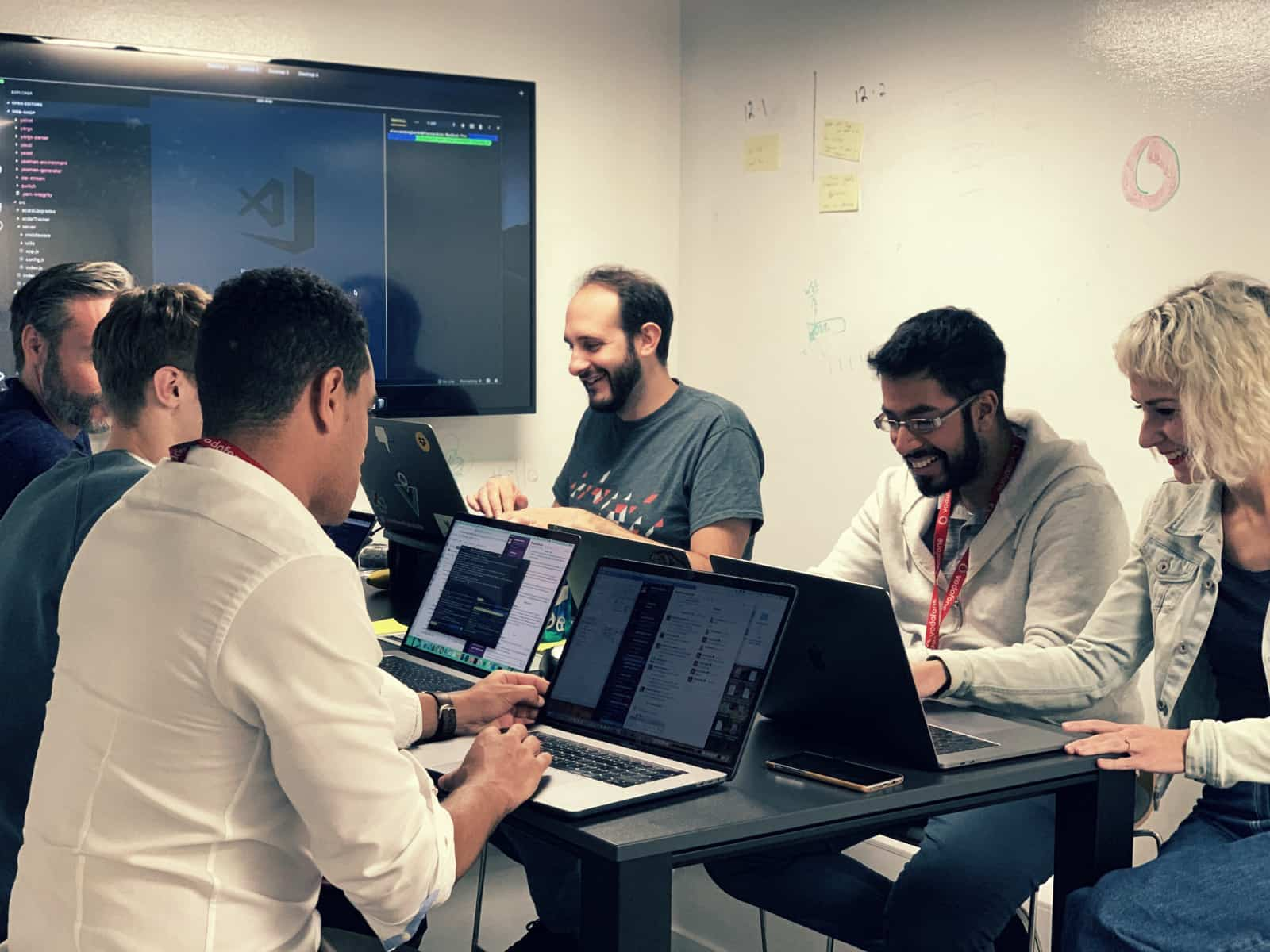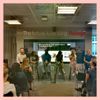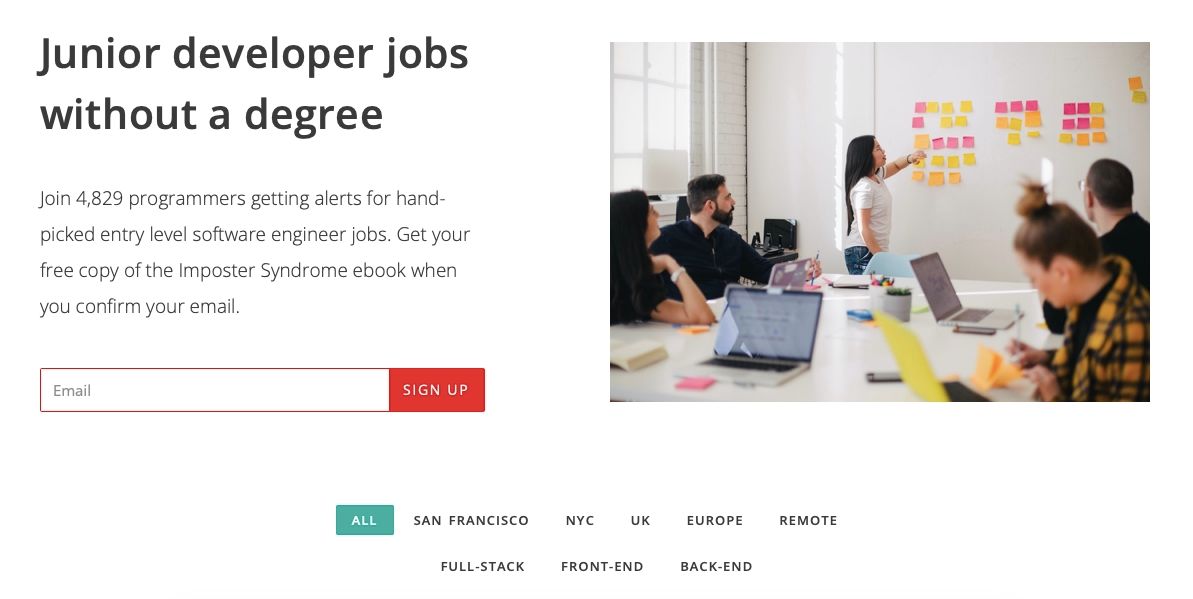Danielle became a programmer after learning to code at Makers coding bootcamp in London. She now works as a Front End Developer at UK telecoms giant Vodafone. In this interview she talks about her transition from musician to developer, her experience learning to code at Makers and her tips for beginners on getting better and getting hired. Thanks to Makers for sponsoring this post.
Hey, can you introduce yourself?
Hiya! I’m Dani, a frontend developer at Vodafone. I'm normally based in their London office when not working from home in beautiful Richmond. (gotta find the silver lining in 2020). Originally hailing from sunny South Africa, I’ve been a performing musician for as long as I can remember.
Although my former career as jazz pianist and vocalist only really took off during a 4-year stint in Dubai in 2010. After that I moved back to South Africa with my partner (now husband). I took up copywriting, emigrated to the UK and decided I wanted to learn to code.
I spent 4 months on a luxury cruiseliner entertaining people and saving up money. I came back to London, adopted the loveliest tabby moggie on the planet, and got into Makers (woohoo!). I landed my job at Vodafone in week 10 of the course and started to work there 3 weeks after graduation. 20 months later I’m still there!
What does a typical day as a software developer at Vodafone look like for you?
I’m in the team responsible for checkout. Like most tech companies we follow Agile methodologies. So a typical day starts with enough time to grab a coffee and catch up on emails and unfinished tasks from the previous day. This is followed by a standup meeting at 10:15 am during which we briefly share things the rest of the team need to know (blockers, dependencies, tasks outside our scope, etc.).
Once a week our scrum master will use this time to quickly go over the Azure DevOps board. It help us tetris-slam those blockers and get back to what we do best - solving problems by building stuff with code (and drink coffee).
After that we’ll each pick up or carry on with a ticket. I mostly work solo, sometimes pairing and sometimes in mob-sessions if there’s a conundrum that needs looking at from more than 2 angles. During permanent lockdown everyone’s encouraged to take 12-1pm off completely. As in “move away from the computer.” There’s a strong mental health initiative at Vodafone which I greatly appreciate.
The rest of the day is spent coding, making and reviewing PRs. I also liase with other teams in Vodafone on data, APIs, environments, and testing and creating independent releases. I have fun in the Slack Random channel, and attend company meetings/lightning talks/workshops.
How did you first get interested in coding?
My husband is a brilliant self-taught principal frontend engineer. I’ve been watching from the sidelines for years, but was too scared to try it for myself. Don’t get me wrong: I wanted to. I felt that I had waited too long to start, and I had no idea where to start, and the longer I waited… well, you get the gist.
As a kid I was always on my dad’s computer; I loved logic-based puzzles and was that nerdy girl on our school’s chess team. I still regret not having learnt the basics of programming then. Times were different, especially in South Africa, and I had my music to focus on.
Fast-forward to December 2017. It was pretty much a combo of me itching to learn. Plus, some health issues made my 8 gigs-a-week schedule less appealing and viable as a full-time job. As well as a desire to challenge myself on a cognitive level… and I’ve definitely succeeded there!

What attracted you to the Makers coding bootcamp?
I initially found out about another London-based bootcamp, Founders & Coders. It sounded amazing. But the entry requirements were pretty strict for an absolute beginner. I decided to train for it anyway. If I didn’t get accepted by their next application date then I’d probably be ready for a junior dev role anyway. In April 2018 I looked at different bootcamps again.
Makers was the only one that appealed to me. They weren’t ageist in the slightest (I was 35 at the time). They had a plethora of success stories. The people there seemed genuinely happy. The one thing that put me off was that it seemed too good to be true. I applied all the same, and the rest is magical did-this-really-happen history.
What did you enjoy about learning to code at Makers?
Everything.
- Dana (Chief Joy Officer/therapist/yoga instructor/awesome human being)
- the students and the coaches
- the culture
- the excitement of learning and applying new theories all the time
- the ancient brick building letting sun dance through its giant windowsthe workshops,
- the lunchtime excursions
- the “aha!” moments when an alien concept suddenly hit home
- the pairing exercisesthe staying-until-7:30pm-to-soak-up-all-the-knowledge days
- the lovely angels who clean and run the show, Johanna and Kinga
- the falling-over-and-laughing-at-yourself yoga sessions- the District Line hour each way with my laptop making tests fail then pass
- the free fruit and breakfast goodies (and fresh bread with Nutella at the start of the week)
- the caring career team.
I’m terrible at ping pong, but that too would be on my list if I weren’t. Mainly, Makers gave me hope, and the belief that I could really be a dev. It was a wonderful time (even though I burnt myself out over weekend projects).

What advice do you have for someone without a CS degree who wants to get into programming?
Start small, and keep going. Find a good resource that works for you. I’ll forever sing freeCodeCamp’s praises. Then work through it and reference trusted guides. W3Schools when you’re new, and MDN docs when you’re more competent and confident. There’s a LOT of info out there and it’s easy to get sucked into the rabbit hole of “patching a problem” and “throwing sh** at a wall”. Also, read books and blogs on programming. And take breaks!
If you don’t want to be a script-kiddy who copy-pastas (which you don’t, I promise you), then practice writing from scratch. You’ll of course learn from copying examples first, but the only way to actually become a coder is to code.
Make peace with the fact that people who studied CS will probably have a wealth of knowledge drilled into them. To this day I know and understand music, especially Jazz theory, better than most professional performing musicians I’ve met. But that doesn’t mean that I’m better than them. On the contrary. A lot of them are masters at their instruments because they practice. And that’s what makes them brilliant.
If you’re learning on your own, it’s a good idea to go to regular meetups with coaches and people at your level. Free Code Camp’s online community is a great starting point. You can’t go wrong with #100DaysOfCode on Twitter either. TL;DR? Don’t be intimidated, work hard, use good source materials, read books, take breaks, code from scratch, go to meetups, and have fun.
Have you ever had imposter syndrome as a developer?
Um, I had constant imposter syndrome as a lifelong musician. So needless to say it followed me into the world of Javascript, NodeJS, React, MobX, Jest, Codecept, Docker, WebPack and AWS.
The amount of times I’ve channelled the “I have no idea what I’m doing” Golden Retriever is embarrassing. It’s also hard sometimes to know whether it’s imposter syndrome or whether you’re really just not cut out for this job. I’ll give you a hint: it’s imposter syndrome. My secret for beating it? Always learning and improving, and gathering empirical evidence of my accomplishments. Being nice to yourself doesn’t hurt, either.
How did you get your first job before even completing the Makers course?
Sometimes after years of struggle, upheaval, stress, and hopelessness, all your determination pays off. There is light at the end of the career-change tunnel. Throughout the course the career coaches would meet with students. They would find out what we wanted and what our strengths were. During week 9 Elspeth Coates, asked me whether I was up for meeting Rob Greville, the head of development at Vodafone. He would interview nine other candidates - all Makers alumni - for two junior frontend roles.
I was the final interviewee of the day. He was genuinely enthusiastic about Vodafone transforming from a telecoms into a tech company. Plus the fantastic dev culture they were building, so when he asked me if I wanted to do the tech test I nearly saluted. And when I saw the test, a simple UI spec, I thought: I can do this. But if I wanted the job I had to do it in React, a framework I hadn’t touched yet, and with tests.
I recreated the designs in HTML, CSS and jQuery. Ben Tomkins, a friend and former Maker, told me exactly what Udemy course to do at 1.5 speed. He graciously lent me his expensive headphones so that I could complete it at class. Thus I learnt React’s barebone-basics in a few hours, and applied it to my test in a few days.
My husband told me about PropTypes and did a quick sanity check before I submitted the final product. A few days later I got the email offer! It was a good week. :) After that, I had the pleasure of having the amazing Lauren Lindsey as my programme manager for the year. She made sure I was in good hands and she checked in weekly.
What are your career ambitions for the future?
I want to become really good at development. There’s so much to know, and there’s always a better way of doing things. New versions/methods/libraries/frameworks are always being released. So at the moment I’m focused on refining my knowledge and usage of React functional components with hooks. We use classical components with MobX state management at work. Also, TypeScript, and performance improvements.
Maybe I’ll build a few handy delightful-to-use apps first, but a game is the long-term goal. As long as I’m also part of the creative storyboarding and UX/UI, I’m happy. I’d also like to get involved with more minorities-in-tech initiatives. But mostly, I want to keep this passion for code alive. I want to make every project I touch significantly better.
Thanks for the interview!
Launch your tech career with Makers, the only coding bootcamp with 5 years experience training software developers remotely. In just 12 weeks, our full-time intensive course will prepare you for work as a software developer in a remote-first world. Rewire your approach to learning, build confidence and unlock new skills with our remote, goal-directed course. Learn, thrive and belong with the support of your cohort and our world class set of industry-leading coaches.



